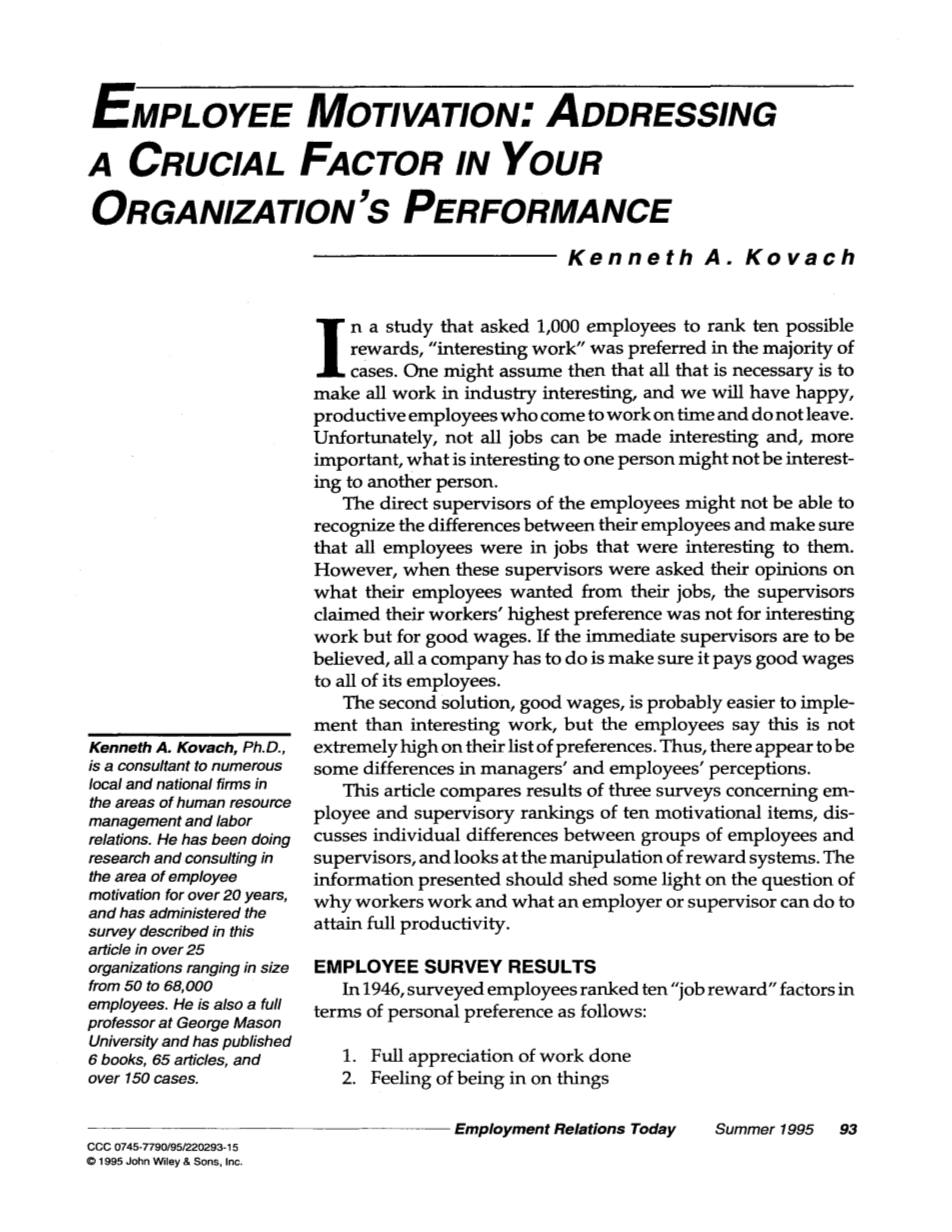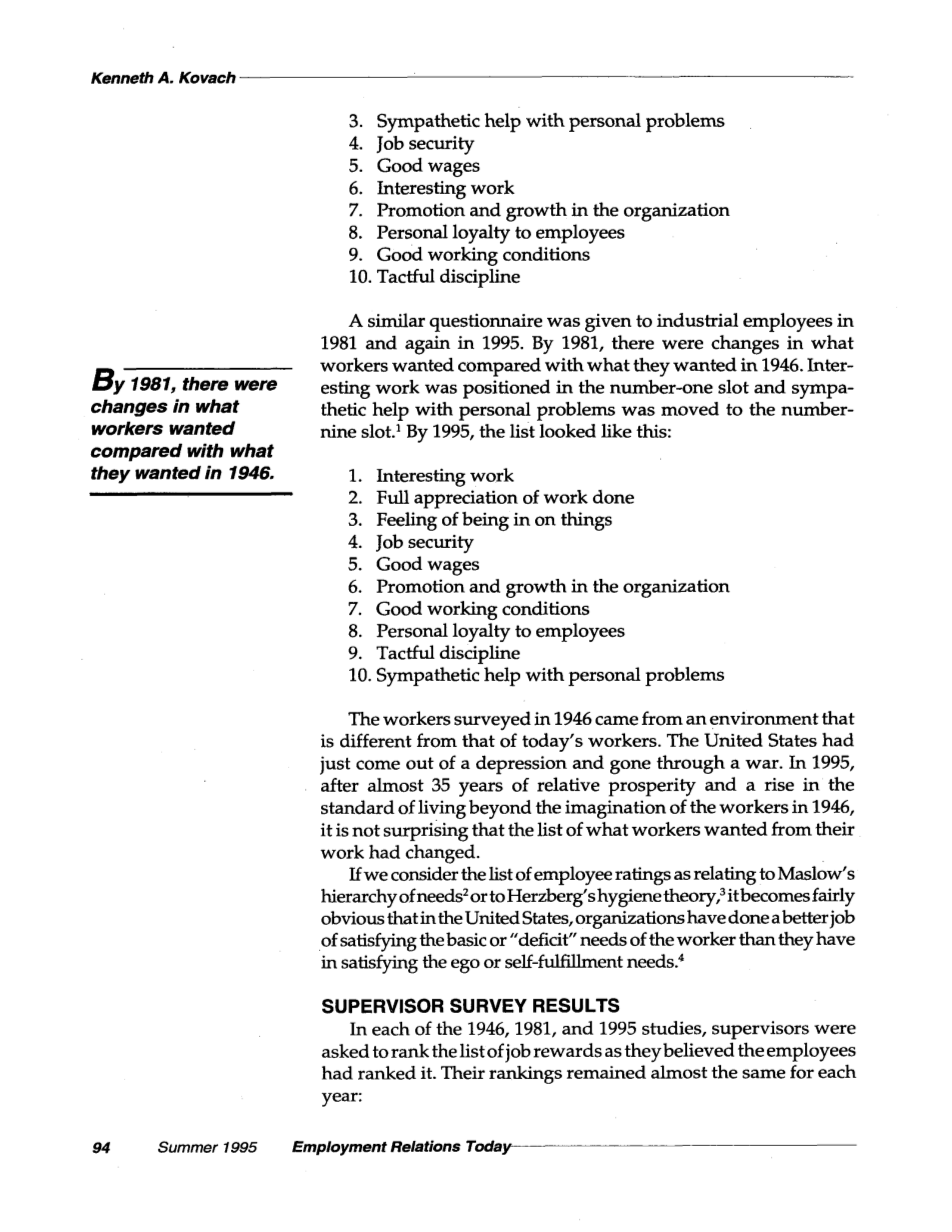

英语原文共 15 页,剩余内容已隐藏,支付完成后下载完整资料
员工激励:解决组织绩效的一个重要因素
Kenneth A. Kovach
作者介绍
Kenneth A. Kovach, Ph. D, is a consultant to numerous local and national firms in the areas of human resource management and labor relations. He has been doing research and consulting in the area of employee motivation for over 20 years, and has administered the survey described in this article in over 25 organizations ranging in size from 50 to 68,000 employees. He is also a full professor at George Mason University and has published 6 books, 65 articles, and over 150 cases.
Kenneth A. Kovach,博士,是在人力资源管理和劳动关系领域的众多本地和国家公司的顾问。他已经在员工激励领域做了20多年的研究和咨询工作,在这篇文章中对25个组织进行了调查,这些组织的规模从50到68,000人不等。他也是乔治梅森大学的教授,已经出版了6本书,65篇文章,150多个案例。
正文
In a study that asked 1,000 employees to rank ten possible rewards, 'interesting work' was preferred in the majority of cases. One might assume then that all that is necessary is to make all work in industry interesting, and we will have happy, productive employees who come to work on time and do not leave. Unfortunately, not all jobs can be made interesting and, more important, what is interesting to one person might not be interesting to another person.
在一项要求1000名员工对10种可能的奖励进行排名的研究中,“有趣的工作”在大多数情况下是首选。人们可能会认为让所有的工作都变得有趣是必要的,并且我们会有按时上班,不会离开的快乐、有生产力的员工。不幸的是,并不是所有的工作都能变得有趣,更重要的是,对一个人来说有趣的事可能对另一个人来说并不有趣。
The direct supervisors of the employees might not be able to recognize the differences between their employees and make sure that all employees were in jobs that were interesting to them. However, when these supervisors were asked their opinions on what their employees wanted from their jobs, the supervisors claimed their workers#39; highest preference was not for interesting work but for good wages. If the immediate supervisors are to be believed, all a company has to do is make sure it pays good wages to all of its employees.
员工的直接上司可能无法识别员工之间的差异,并确保所有员工都从事有趣的工作。然而,当这些主管被问及他们的员工想从他们的工作中得到什么时,主管们声称他们的员工最看重的不是有趣的工作,而是高工资。如果是直接的监管者,他们会相信所有的公司必须做的是确保它支付给所有员工的好工资。
The second solution, good wages, is probably easier to implement than interesting work, but the employees say this is not extremely high on their list of preferences. Thus, there appear to be some differences in managers#39; and employees#39; perceptions. This article compares results of three surveys concerning employee and supervisory rankings of ten motivational items, discusses individual differences between groups of employees and supervisors, and looks at the manipulation of reward systems. The information presented should shed some light on the question of why workers work and what an employer or supervisor can do to attain full productivity.
第二个解决方案,即很好的工资,可能比有趣的工作更容易实现,但是员工们说这并不是他们的首选项。因此,管理者和员工的感知似乎存在一些差异。这篇文章比较了三份关于员工和十个激励项目的管理排名的调查结果,讨论了员工和主管之间的个体差异,并研究了奖励系统的操作。所提供的信息应该能说明为什么工人工作,雇主或主管能做些什么来获得充分的生产力。
EMPLOYEE SURVEY RESULTS
员工调查结果
In 1946, surveyed employees ranked ten 'job reward' factors interms of personal preference as follows:
1. Full appreciation of work done
2. Feeling of being in on things
3. Sympathetic help with personal problems
4. Job security
5. Goodwages
6. Interesting work
7. Promotion and growth in the organization
8. Personal loyalty to employees
9. Good working conditions
10. Tactful discipline
在1946年,被调查的员工对10个“工作奖励”的因素根据个人偏好进行了以下排名:
1、对工作完成的充分欣赏;
2、任务的参与感;
3、对个人问题富有同情心的帮助;
4、工作保障;
5、高工资;
6、有趣的工作;
7、在组织内的晋升和成长;
8、对员工群体忠诚;
9、良好的工作环境;
10、灵活的纪律规范。
A similar questionnaire was given to industrial employees in 1981 and again in 1995. By 1981, there were changes in what workers wanted compared with what they wanted in 1946. Interesting work was positioned in the number-one slot and sympathetic help with personal problems was moved to the number-nine slot. By 1995, the list looked like this:
1. Interesting work
2. Full appreciation of work done
3. Feeling of being in on things
4. Job security
5. Goodwages
6. Promotion and growth in the organization
7. Good working conditions
8. Personal loyalty to employees
9. Tactful discipline
10. Sympathetic help with personal problems
1981年和1995年又向工业雇员提供了一份类似的调查问卷。到1981年,与1946年相比,工人们的需求发生了变化。有趣的工作被定位在第一个,对个人问题富有同情心的帮助被移动到第九个。到1995年,这个列表看起来是这样的:
1、有趣的工作;
2、对工作完成的充分欣赏;
3、任务的参与感;
4、工作保障;
5、高工资;
6、在组织内的晋升和成长;
7、良好的工作环境;
8、对员工群体忠诚;
9、灵活的纪律规范;
10、对个人问题富有同情心的帮助。
The workers surveyed in 1946 came from an environment that is different from that of todayrsquo;s workers. The United States had just come out of a depression and gone though a war. In 1995, after almost 35 years of relative prosperity and a rise in the standard of living beyond the imagination of the workers in 1946, it is not surprising that the list of what workers wanted from their work had changed. If we consider the list of employee ratings as relating to Maslowrsquo;s hierarchy of needs or to Herzbergrsquo;s hygiene theory: it becomes fairly obvious that in the united States, organizations have done a better job of satisfying the basic or ”deficit” needs of the worker than they have in satisfying the ego or self-fulfillment needs.
1946年接受调查的工人来自一个与今天的工人不同的环境。美国刚刚走出萧条,经历了一场战争。在1995年,在经历了近35年的相对繁荣和1946年工人们想象的生活水平的提高之后,工人们想要从他们的工作中得到的东西已经改变了,这并不奇怪。
如果我们把员工评级的列表与马斯洛的需求层次论或赫茨伯格的双因素理论联系起来:在美国,组织在满足员工的基本或“赤字”需求方面做得比满足自我或自我满足的需要要好得多。
SUPERVISOR SURVEY RESULTS
主管调查结果
In each of the 1946,1981, and 1995 studies, supervisors were asked to rank the list of job rewards as they believed the employees had ranked it. Their rankings remained almost the same for each year:
1. Good wages
2. Job security
3. Promotion and growth in the organization
4. Good working conditions
5. Interesting work
6. Personal loyalty to employees
7. Tactful discipline
8. Full appreciatio
全文共39628字,剩余内容已隐藏,支付完成后下载完整资料
资料编号:[12877],资料为PDF文档或Word文档,PDF文档可免费转换为Word
您可能感兴趣的文章
- 薪酬满意度作为工作满意度的先行因素:建立一个回归模型,确定公共和私人组织中薪酬满意度与工作满意度之间的线性关系外文翻译资料
- 胜任力与胜任力、胜任力模型与胜任力模型的比较研究外文翻译资料
- 如何提高企业网络招聘的有效性外文翻译资料
- 为初级职位招聘大学生,在制定战略和战术校园招聘计划时,需要考虑哪些问题?外文翻译资料
- 基于能力的招聘:招聘和留住成功员工的关键外文翻译资料
- 员工培训对体育门票销售人员工作满意度的影响外文翻译资料
- 由雇主参与的创新型员工激励模式外文翻译资料
- 浅析企业文化与企业绩效的相关性 ——以苏州金色未来信息咨询股份有限公司为例外文翻译资料
- 互联网背景下基于平衡计分卡的计算机绩效评价系统外文翻译资料
- 提高斯洛伐克公共行政部门招聘过程的效率外文翻译资料


